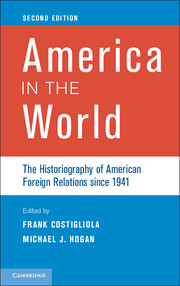Book contents
- Frontmatter
- Dedication
- Contents
- List of Contributors
- Preface
- 1 Introduction
- 2 The Charlie Maier Scare and the Historiography of American Foreign Relations, 1959–1980
- 3 Chaps Having Flaps: The Historiography of U.S. Foreign Relations, 1980–1995
- 4 Still Contested and Colonized Ground: Post–Cold War Interpretations of U.S. Foreign Relations during World War II
- 5 Recent Literature on Truman’s Atomic Bomb Decision
- 6 The Cold War
- 7 Cold War Presidents: Dwight D. Eisenhower, John F. Kennedy, Lyndon Baines Johnson, and Richard M. Nixon
- 8 The War that Never Ends: Historians and the Vietnam War
- 9 Culture and the Cold War: U.S.–Latin American Historiography since 1995
- 10 Impatient Crusaders: The Making of America’s Informal Empire in the Middle East
- 11 Explaining the Rise to Global Power
- 12 Bringing the Non-State Back In
- 13 Technology and the Environment in the Global Economy
- 14 U.S. Mass Consumerism in Transnational Perspective
- 15 A Worldly Tale
- Index
- References
4 - Still Contested and Colonized Ground: Post–Cold War Interpretations of U.S. Foreign Relations during World War II
Published online by Cambridge University Press: 05 June 2014
- Frontmatter
- Dedication
- Contents
- List of Contributors
- Preface
- 1 Introduction
- 2 The Charlie Maier Scare and the Historiography of American Foreign Relations, 1959–1980
- 3 Chaps Having Flaps: The Historiography of U.S. Foreign Relations, 1980–1995
- 4 Still Contested and Colonized Ground: Post–Cold War Interpretations of U.S. Foreign Relations during World War II
- 5 Recent Literature on Truman’s Atomic Bomb Decision
- 6 The Cold War
- 7 Cold War Presidents: Dwight D. Eisenhower, John F. Kennedy, Lyndon Baines Johnson, and Richard M. Nixon
- 8 The War that Never Ends: Historians and the Vietnam War
- 9 Culture and the Cold War: U.S.–Latin American Historiography since 1995
- 10 Impatient Crusaders: The Making of America’s Informal Empire in the Middle East
- 11 Explaining the Rise to Global Power
- 12 Bringing the Non-State Back In
- 13 Technology and the Environment in the Global Economy
- 14 U.S. Mass Consumerism in Transnational Perspective
- 15 A Worldly Tale
- Index
- References
Summary
Although World War II ended more than sixty-five years ago, it continues to exercise an enormous influence over contemporary thought and historical scholarship. This is true not only in the obvious field of military history, but in diplomatic history as well.
In previous essays I noted that the historiography of U.S. foreign relations during World War II possessed characteristics both similar to and different from other areas of intense historical dispute. Major similarities included the large volume of writings, the impact of contemporary concerns on evolving interpretations, and the effect of new schools of thought regarding U.S. foreign relations in general. World War II diplomacy was a unique field, however, in at least two important respects. First, the combination of massive documentary evidence and continued popular interest in the war had resulted in a volume of literature so enormous and so rapidly growing as to merit special mention. Second, although the resulting schools of interpretation reflected to an extent those of U.S. foreign relations in general, they possessed a distinctive quality because of the enormous influence of the Cold War on the interpreters. That influence had led most historians for many years to analyze World War II diplomacy primarily in terms of its role in the post-war Soviet-American conflict.
- Type
- Chapter
- Information
- America in the WorldThe Historiography of American Foreign Relations since 1941, pp. 57 - 82Publisher: Cambridge University PressPrint publication year: 2013

